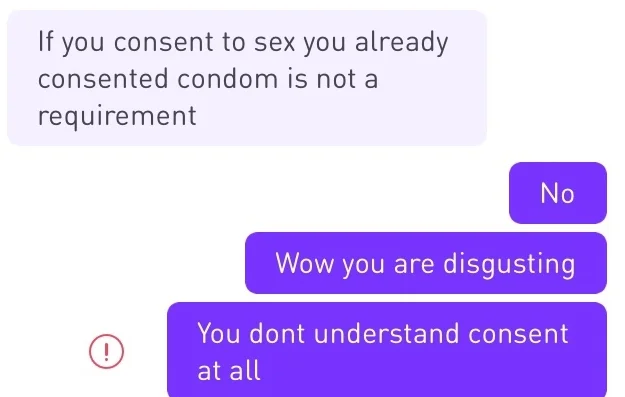Last Friday, PCA staff, students, and campus volunteers worked for two hours to install our annual Red Flag Campaign on the lawn outside of the Plaza building. Each year, the PCA has installed this eye-catching display, but what for?
The Red Flag Campaign is a national campaign which was created by and for college campuses with the guidance of the Virginia Sexual Assault and Domestic Violence Alliance. 1 in 4 college-aged folx experience relationship violence and the purpose of the red flag campaign is to raise awareness around “red flags” in unhealthy and abusive relationships. This way friends, family, and loved ones can be active bystanders when they see something happening in someone’s relationship that isn’t right or isn’t healthy. So, what are some of those red flags? Here are 7.
Jealousy
There’s this weird idea in our culture that jealousy = love and that just simply isn’t true. If a partner is “over-protective”, jealous, or always on their partner’s case about who they are spending time with, when, how, and why, this isn’t about caring about the person: it’s about controlling who they spend their time with. Relationship violence is a constant cycle of a perpetrator working to obtain power & control and jealousy is one emotionally abusive way that control is established and maintained. It doesn’t help that our culture laughs it off as cute or proof of someone’s devotion. (Not to mention that telling your partner to shut up in any kind of seriousness can also be considered verbal abuse)
2. Emotional Abuse
Calling your partner cutesy names Is par for some relationships, but calling your partner names because you are mad at them or names based on things you know they feel badly about is not ok. Like, for instance, calling a partner “Piggy Pig” when they feel insecure about their weight? Not cool.
3. Victim Blaming
This may be a cringey ad from the 1950s, but there is nothing that makes a person harming their partner in any way ok, even not store-testing coffee (whatever that is). Remember what I said about abuse being a cycle of power & control? A common tactic of abusive partners is to blame their poor and abusive behavior on the actions of the person they harmed. Things like “If you had only had dinner ready when I came home, I wouldn’t have had to yell at you” or “If you’d only given me your full paycheck when I asked for it, I wouldn’t have had to punch the wall” are common victim blaming sentiments in an abusive relationship.
4. Stalking
Tell me if you can find something creepier to say to someone that “every breath you take, every move you make, i’ll be watching you.” Decidedly NOT ROMANTIC. When someone lays a clear boundary about how they wish to be contacted - or NOT - and the person they’ve laid the boundary with doesn’t respect it, this is stalking. We often brush stalking off as cute or sweet (as in the whole TV show Crazy Ex-Girlfriend” but it’s anything but. Stalking behavior can be anything from physically following another person to sending them unwanted messages to showing up places where they have no other reason to be to sending unwanted gifts. Stalking is serious, ya’ll. If it’s a safe option for you, call the real police if anyone ever says any of these lyrics for real.
5. Physical abuse
Physical abuse is often the first thing people think of when we begin discussing relationship violence. It’s the most obvious outward sign that we as a society have agreed indicates maltreatment. There is nothing that makes physical abuse ok, whether it results in bruises or abrasions others can see or not. Often, people experiencing physical abuse will take pains to hide the evidence from others (for a series of very valid reasons). For instance, if you notice your friend or loved one wearing long sleeves when it’s 90 out, maybe ask them about it. It could be laundry day, or it could be something else.
6. Sexual Abuse
There still exists an idea that sexual abuse is impossible within the confines of a romantic or intimate relationship. It wasn’t until 1993 in fact that “marital rape” actually became illegal in all 50 states and some states still have laws on the books which make it difficult for sexual violence within a relationship to be prosecuted. Regardless of someone’s official relationship status, sex is never a guaranteed commodity. A person - solely by virtue of being a person - has the right to determine who touches their body and how at all times. Sexual violence isn’t just forced intercourse either. As illustrated by the text above, the fairly new trend of “stealthing” (removing a barrier method without a sex partner’s knowledge after they agreed to have sex with the barrier method) is also sexual violence. As is coercion, performing sexual acts while someone is unconscious (sleeping or intoxicated), forcing someone to perform sex acts on another person, or any nonconsensual sexual activity. Just because you buy someone dinner or pay half the rent does NOT mean they owe you sex.
7. Isolation
Maybe it’s telling that I don’t have an interesting listicle image for this one. Another common power & control tactic is isolating the other partner from their family and friends. As with many other power & control tactics, it can start out very subtle with something like “I just don’t like you hanging out with that person” or “I just miss you so much when you’re not with me” and these, on their own, may not be red flags. However, when one person becomes every person but the partner and someone can look back and realize that they haven’t talked to anyone but their partner in a shocking amount of time, this is when red flags should go up. If your friend or loved one drops off the face of the earth, don’t just assume they’re lost in a haze of new relationship bliss, keep in touch!
These are only a few of the many signs of relationship violence. Bottom line: If something seems not ok to you, it probably isn’t. Don’t fall into the trap of assuming it’s none of your business, if your loved one seems in trouble step up and ask if they’re ok!
Not sure how to do that? Call or stop by the PCA any time!






